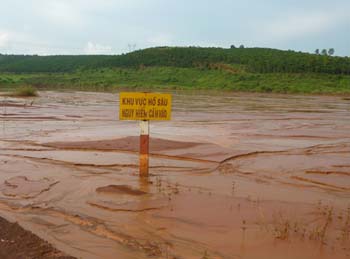A representative from PanNature suggested clearly defining the non-profit status of science and technology organizations to facilitate research, technology transfer, and application. This clarity would also enhance international collaboration and attract funding.

Introducing the Extractive Industries Transparency Initiative in mining and quarrying industry
A workshop on “Introduction of the Extractive Industries Transparency Initiative (EITI)”, co-organized by the Consultancy on Development (CODE) and the Centre for People and Nature Reconciliation (PanNature) has taken place in Hanoi.
The workshop was attended by numerous experts and management from the National Assembly (NA) Committee on Science, Technology and Environment, the Ministry of Industry and Trade, the Vietnam Chamber of Industry and Commerce and the US’s Revenue Watch Institute.
 Photo: PanNature.
Photo: PanNature.
Speaking at the opening ceremony, Doctor Vo Nhan Tuan, Vice Chairman of the NA Committee on Science, Technology and Environment said that the implementation of EITI in Vietnam may meet some difficulties, such as the actually implementing in reality. Therefore, the workshop offered opportunities to have information and international material as well as propose specific solutions for real circunstances in a country promoting the value of the mineral ore industry in economic growth.
Almost all delegates in the workshop agreed that the participation of EITI could be a good tool which helps Vietnam concretize its policies on the real situation as the EITI itself is a solution for a more transparent environment in the mineral exploitation industry.
EITI is a volunteer coalition initiative amongst the government, companies, local civil society organisations and international organisations aiming to enhance transparency and accountability in the extractive industry. To date, there are 35 EITI implementing countries around the world. The EITI is also widely supported by extractive companies and the civil society organisations. So far, there are 50 top international extractive companies and hundreds of the civil society organisations and mining associations.
Vietnam has a variety of mineral resources with over 60 types of minerals in 5,000 ore deposits. Some are substantial reserves at world and regional levels, such as bauxite, titanium, rare earth and limestone. Some are potential reserves, like coal with more than 210 billion tonnes and iron with 3.5 billion tonnes
Sustainable development as well as transparency in Vietnam’s mineral ore industry in the development and integration process with the world’s mine ores industry is an important requirement for the development process. Vietnam is targeting to build and develop it’s exploitation industry and mineral resource processing with modern technology and eco-friendliness in order to ensure sustainable development, and meet the local demand for consumption and export for a long time.
Although, Vietnam has had access to the EITI since 2007, the research process and the building of participation steps for Vietnam previously stopped at the first step.



